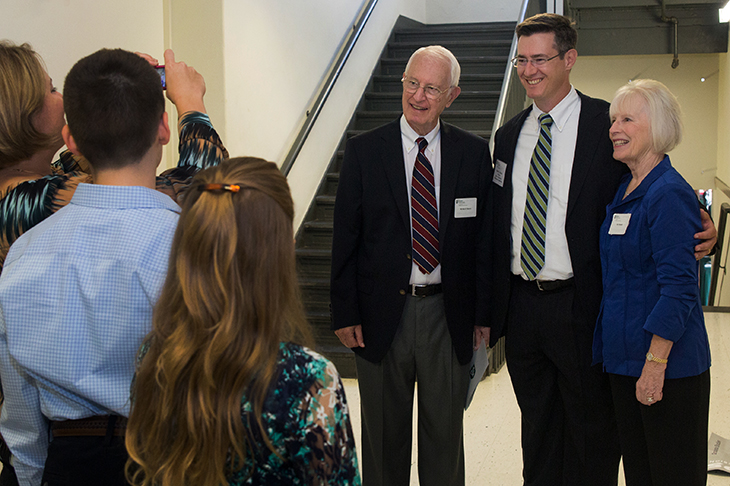Big plans for reducing carbon footprint

At the investiture ceremony naming him to the Entergy Chair in Clean Energy Engineering, Daniel Shantz, center, celebrates with his parents, Richard and DJ Shantz. Shantz is working to find a way for you to continue to enjoy the latest technology while reducing our carbon footprint. (Photo by Jamie Thorpe)
As technology advances, so does our dependence on the latest products. At the same time, our global energy consumption is growing at rapid rates.
Daniel Shantz, newly invested to hold the Entergy Chair in Clean Energy Engineering at Tulane University, is working to find a way for consumers to continue enjoying the latest technology while reducing their carbon footprint.
“We all like to have energy whenever we want it. But the big challenge is to develop new technologies so we can sustainably produce that energy.”—Daniel Shantz, professor, chemical and biomolecular engineering
A ceremony at Tulane on Friday (Oct. 17) explored Shantz"s research plans and honored him as the new chair holder. He is a professor in the Department of Chemical and Biomolecular Engineering. The chair was named previously the Entergy Chair in Electric Power Engineering and it was held by Parviz Rastgoufard.
“We all like to have energy whenever we want it,” Shantz said. “But the big challenge is to develop new technologies so we can sustainably produce that energy.”
Shantz"s new lab plans to tackle that challenge on two fronts. He hopes to develop technology that will transform carbon dioxide emissions from air into usable products such as plastics and fuel. Shantz also has ideas on how to effectively capture alternative fuels, such as corn-based ethanol, without excess waste and energy.
“For instance, the conversion of plant matter (biomass) to fuels and chemicals requires large amounts of water and energy to remove the desired products from water,” Shantz said. “Our lab will look at low energy routes to remove those high-value molecules.”
In his previous lab, Shantz found that he could selectively capture certain molecules of value, from a mixture with many different molecules, in an energy-efficient way. He hopes to expand on those findings at Tulane. Shantz"s lab also will work to convert carbon dioxide in the atmosphere to methanol, which can be used as a building block for a variety of products, including fuel.
“There are a lot of challenges that the planet faces and meeting these needs are not trivial,” Shantz said. “But we can all agree that it is an important challenge.”
